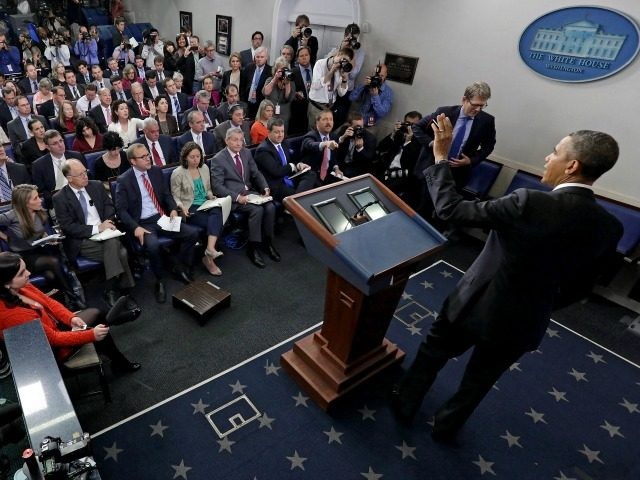TEL AVIV – The Obama administration utilized a narrative that was “often misleading or false” to sell the Iran nuclear deal to the public, a lengthy New York Times profile revealed on Thursday.
The Orwellian public relations strategy utilized so-called arms-control experts who were spoon fed tidbits that validated White House claims and those materials were in turn disseminated to “hundreds of often-clueless reporters,” the Times reported.
The dark plot was detailed in a New York Times Magazine profile of President Obama’s deputy national security advise Ben Rhodes titled, “The Aspiring Novelist Who Became Obama’s Foreign-Policy Guru.”
The article contains interviews with Rhodes and scores of top Obama administration officials.
One section cites Rhodes, Tanya Somanader, the director of digital response for the White House Office of Digital Strategy, and Robert Malley, senior director at the National Security Council, explaining the genesis and execution of the marketing plan to sell the Iran deal.
The Times reports:
The way in which most Americans have heard the story of the Iran deal presented — that the Obama administration began seriously engaging with Iranian officials in 2013 in order to take advantage of a new political reality in Iran, which came about because of elections that brought moderates to power in that country — was largely manufactured for the purpose for selling the deal. Even where the particulars of that story are true, the implications that readers and viewers are encouraged to take away from those particulars are often misleading or false.
The Times reports the almost fictional narrative shaped by Rhodes:
the “story” of the Iran deal began in 2013, when a “moderate” faction inside the Iranian regime led by Hassan Rouhani beat regime “hard-liners” in an election and then began to pursue a policy of “openness,” which included a newfound willingness to negotiate the dismantling of its illicit nuclear- weapons program.
In reality, reported the Times, the talks began in mid-2012, a critical timeline since this was before the so-called moderate camp were “chosen in an election among candidates handpicked by Iran’s supreme leader, the Ayatollah Ali Khamenei.”
The Times related that the idea of a supposed newly moderate leadership in Iran was “politically useful to the Obama administration.” Malley explained “experts” were utilized to create an “echo chamber” that disseminated administration claims about Iran to “hundreds of often-clueless reporters” in the news media.
In the spring of last year, legions of arms-control experts began popping up at think tanks and on social media, and then became key sources for hundreds of often-clueless reporters. “We created an echo chamber,” he admitted, when I asked him to explain the onslaught of freshly minted experts cheerleading for the deal. “They were saying things that validated what we had given them to say.”
Rhodes asked Somanader to create a rapid response Twitter account to disseminate reactions to criticism of the Iran nuclear deal.
Somanader admitted that The Atlantic’s Jeffrey Goldberg and Laura Rozen of Al-Monitor helped to sell the administration narrative to the public.
For those in need of more traditional-seeming forms of validation, handpicked Beltway insiders like Jeffrey Goldberg of The Atlantic and Laura Rozen of Al-Monitor helped retail the administration’s narrative. “Laura Rozen was my RSS feed,” Somanader offered. “She would just find everything and retweet it.”
Rhodes told Times reporter David Samuels that the marketing strategy took advantage of the “absence of rational discourse.”
When I suggested that all this dark metafictional play seemed a bit removed from rational debate over America’s future role in the world,Rhodes nodded. “In the absence of rational discourse, we are going to discourse the [expletive] out of this,” he said. “We had test drives to know who was going to be able to carry our message effectively, and how to use outside groups like Ploughshares, the Iran Project and whomever else. So we knew the tactics that worked.” He is proud of the way he sold the Iran deal. “We drove them crazy,” he said of the deal’s opponents.
Earlier in the piece, Samuels described the way in which Rhodes serves as somewhat of a ventriloquist for reporters. “The narratives he frames, the voices of senior officials, the columnists and reporters whose work he skillfully shapes and ventriloquizes…”
Perhaps one of the most telling statements from Rhodes himself reveals some of the motivation for the Iran nuclear deal – that the agreement advances Obama’s general academic foreign policy philosophies.
Rhodes related: “It’s the possibility of improved relations with adversaries. It’s nonproliferation. So all these threads that the president’s been spinning — and I mean that not in the press sense — for almost a decade, they kind of all converged around Iran.”
Aaron Klein is Breitbart’s Jerusalem bureau chief and senior investigative reporter. He is a New York Times bestselling author and hosts the popular weekend talk radio program, “Aaron Klein Investigative Radio.” Follow him on Twitter @AaronKleinShow. Follow him on Facebook.

COMMENTS
Please let us know if you're having issues with commenting.